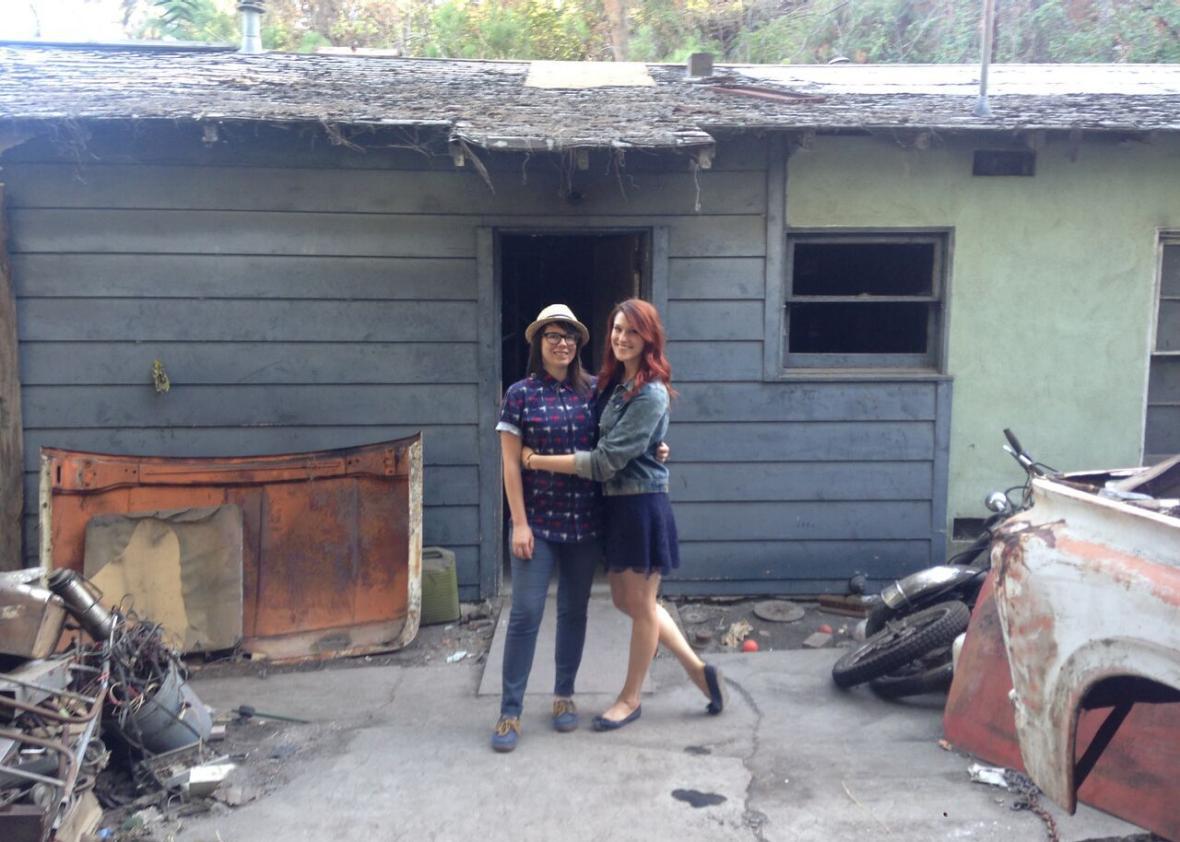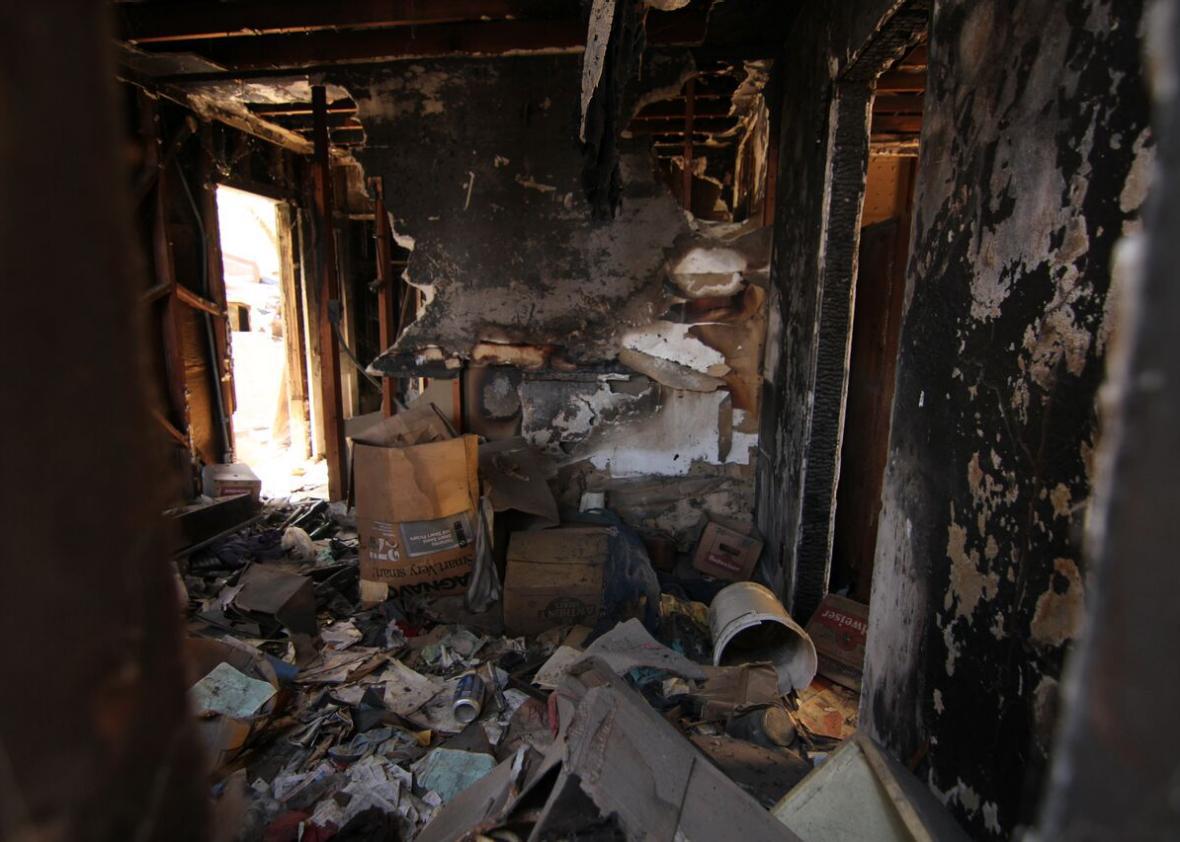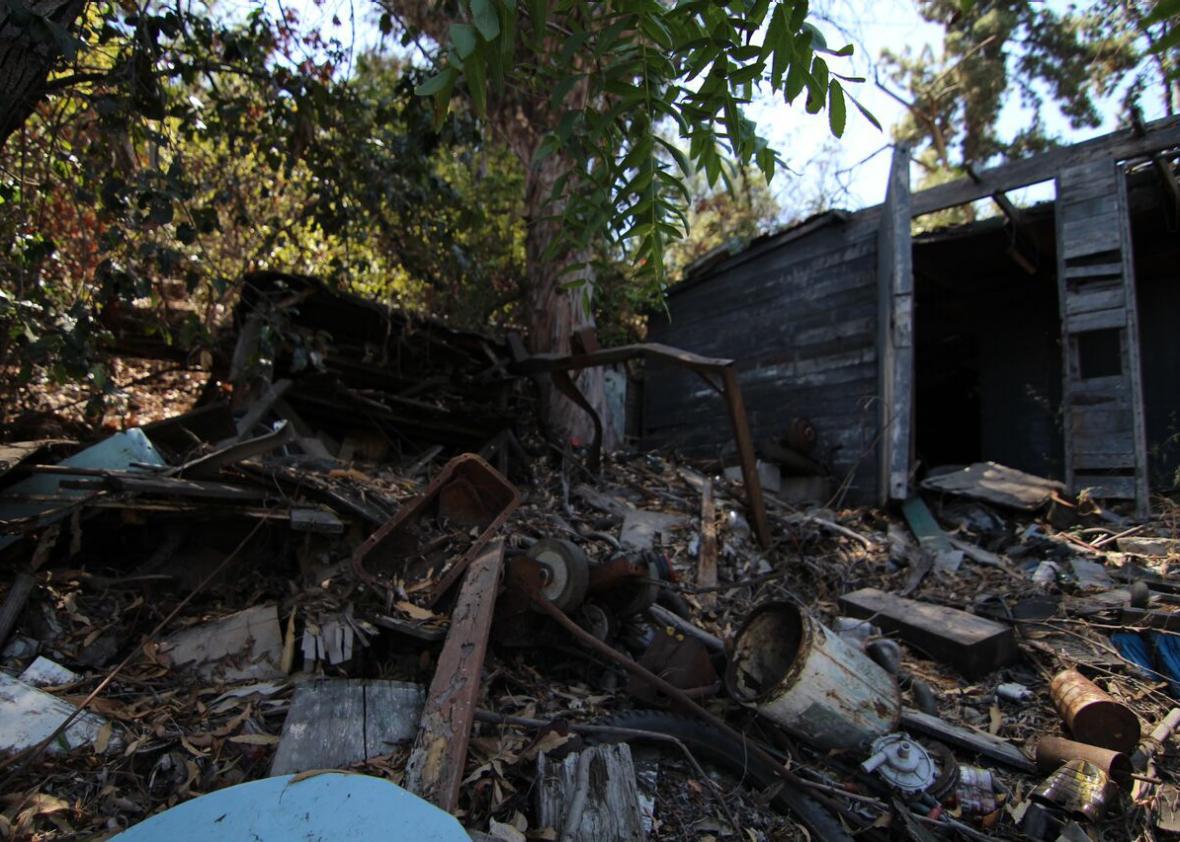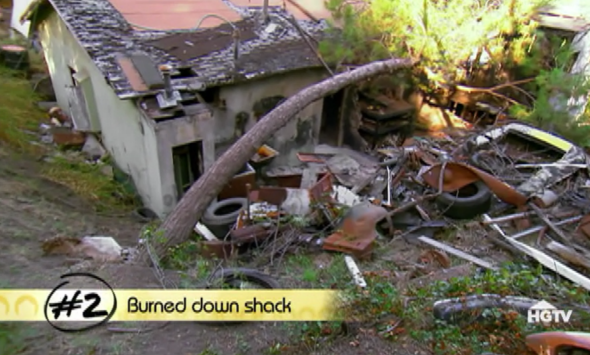An episode of HGTV’s Tiny House Hunters usually follows a pretty standard formula: As on the original House Hunters, participants must choose between three homes, weighing the merits and drawbacks of each against their budget and wish list of criteria, the only real difference of the spinoff being that everything is—well, smaller. Slate’s Willa Paskin has called the experience of watching this type of show “a warm bath, a calming tour through the notoriously stressful experience of homeownership.”
So it was more than a little shocking when Aubree Bernier-Clarke and Jordan Strang, a couple living in Los Angeles who appeared on Tiny House Hunters in search of an itty-bitty fixer-upper of their own, passed over two perfectly sensible options—a “rustic cabin” and a “roomy ranch”—in favor of an actual, honest-to-goodness, burned-down shack.

J. Gimbrone/Courtesy of Aubree Bernier-Clarke
If an ordinary episode of House Hunters is a warm bath, then this was more of a cold shower, and reaction on social media to the couple’s decision was swift and disbelieving.
Slate spoke to Strang and Bernier-Clarke about their experience on Tiny House Hunters and the decision that rocked the real estate entertainment world. This interview has been edited and condensed for clarity.
How prepared were you two for what you were going to see when you arrived at the property for the first time? Did the realtor warn you what to expect?
Aubree: I had been cruising around on Zillow and I happened to see that place, and the only photo that you could see was a Google Maps image of what looked like a lot of trees and a sort of singed roof. I was like, “Huh.”
Jordan, you seemed particularly startled by what you were seeing.
Jordan: I was pretty shocked that you could legally sell that as a house. I guess I was naive to the L.A. real estate market. We had looked at other houses before being on the show, and we had definitely seen some weird additions or things that clearly were not up to code. But I think the scope of what we ended up buying was much different. Because—and you’ve seen the footage obviously—it was in such bad shape and also so dangerous.
What was it like to walk through that property for the first time?
Jordan: I was a little bit worried that we weren’t wearing protective headgear. Basically, the house had gone through a tremendous amount of damage and then, on top of that, it had just sat in that state for—how long had it been?
Aubree: It had been abandoned since 1998.
Jordan: So there was more than one colony of feral cats that had been living inside of it.
Aubree: Whole generations of feral cats.
Have they now been evicted in favor of your own cat?
Aubree: Actually, one of the first times we were over there, there were a bunch of coyotes in the yard. So I think they evicted the feral cats already.
It sounds like there was quite a hierarchy of wild animals living at this property.
Jordan: Yeah. The smell, also, that was going on inside that house was a fragrance I cannot describe and would not wish upon anyone.
What did it smell like?
Aubree: You’re just lucky that “smellovision” does not exist.
Wait, what kind of smell was it? Like a burned smell?
Aubree: A little bit of a burn smell remains, which is shocking considering how long it had been since the house actually burned. But the smell was the most potent, musty litterbox smell that you can imagine.
Time for the obvious question: Your two other options at the end of your house hunt were a cabin and a ranch. Why in the world did you choose a literal burned-down shack?
Aubree: Well, to be honest, the burned-down shack is in a dramatically superior location than either of the other two houses, and I don’t know how much time you’ve spent in L.A., but if you’re not living near where you need to be, your life is terrible.
I actually really liked that cabin a lot, but the location was just not practical. If we were retiring, I probably would have wished we’d have taken that place because it was definitely more move-in ready.

Aubree Bernier-Clarke
Aubree, you were much quicker to see the potential in the house. How did you manage to persuade Jordan that this was a plausible home for you two?
Aubree: What didn’t make it into the show is that the first time Jordan saw the property, I asked her to look beyond the trash and the burned-down-ness and to see the potential of the views and the big trees, which is something that was important to us—to be able to have trees that you can’t get everywhere in L.A. And the place has a vibe that is probably something you can’t understand until you go there, but it feels so tranquil. There’s birds chirping, there’s a breeze—you feel like you’re out on a mountain somewhere.
Jordan: I think that the more we saw other real estate that was in our price range in L.A., the more I warmed to it. There are so many things you just don’t know when you buy a house. At least on that property, we knew exactly what we were getting into.
Have you since learned more about the history of the property? What caused the fire?
Aubree: We got a lot of information from the neighbors. The man that had lived there before, ironically, was a retired firefighter, and he was a mechanic. You could see from the footage that he had all kinds of car stuff and motorcycle parts and and oil cans everywhere.
The fire was some kind of a shop fire. It was an accident, and the tragedy of it is that he hadn’t insured the property at that time, so the place burned, and he wasn’t able to afford to fix it. He lived there in an RV for many years, and then he got married and moved away, and he kept the house in his family. So then when he finally passed away he left it to his kids, and then that’s who we bought it from.
How did your friends and family react when you told them that you had purchased a burned-out shack instead of a more traditional tiny house?
Aubree: I don’t think any of them really understood what we meant until they saw the episode of House Hunters, actually, because my mom had known for a long time and she was just kind of like, “Oh, burned-down shack, ha-ha.” And then [when she saw the episode] she was like, “That place is scary, Aubree! I didn’t realize that’s what you were getting into.”
Jordan: My family lives in the South, where real estate is priced much differently. Once we decided on that house, I was like, “Well, Mom, I bought the most expensive trash dump you’ve ever seen.”

Aubree Bernier-Clarke
There was what looked like a lot of trash lying around. Was there anything salvageable, or did you get rid of everything?
Aubree: We just kept a few things, like we’ve kept a barrel and a wash bin, some things that we can turn into planters. There’s a couple of really cool handmade workbenches that are really sturdy and nice, some license plates that are kind of cool. There’s some kind of propeller that I found that I want to do something with.
Jordan: There were a lot of layers to the trash. We ended up hauling off 60,000 pounds of trash and debris that was not usable or even safe to recycle, because of the rust and stuff. And that’s what’s come off the property so far. It’s much better, but it’s still not completely clean.
How much of the structure of the house itself were you able to save?
Jordan: We were able to patch the existing foundation and we’re keeping the parts of the framing within the exterior that you see at the end of the episode. And that’s it.
The episode ends with you viewing plans for the property with the architects. Tell me a little bit more about what you’re building.
Jordan: Ultimately, we’re doing a one-bedroom, one-bath home and then we’re going to hopefully include a secondary, lofted bonus space that we could use for guests or as a reading area. The lot is really big and has all of these really amazing spots, and over time we want to put maybe a pool. We definitely want to have a lot of the focus be on celebrating the outdoor space and having a big deck, and being able to enjoy the property itself because it is really beautiful.
You started with a $265,000 budget. You paid $155,000 for the shack and the property—does it look like you’re going to fall within your budget for the renovations?
Aubree: No. We’re looking more at $325,000 for the finished house, and probably in the next couple years we’ll spend another $25,000 or so on landscaping and making the property nicer.
Jordan: All in all, it will probably be almost $100,000 over [budget].
Aubree: But for L.A., it’s still going to be amazing. You can buy an empty lot in L.A. for easily $155,000, and the fact that we bought a lot that already has electricity, it already has water, and it’s permitted for a house—that’s worth at least another $100,000. I think it’s been tough, but it’s definitely going to be a great investment, and we’re going to love living there.
Jordan: We read the Twitter comments, also, and people were like, “Oh my God, I just watched two totally insane people pay this much for literal trash.” But if you are in L.A., that’s what it costs!
